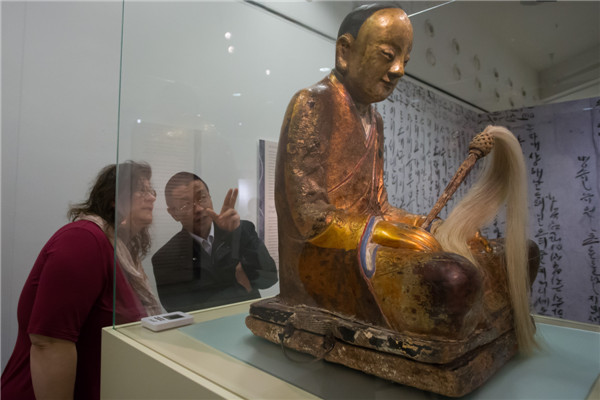
The Buddha statue on display at the Hungarian Natural History Museum in Budapest in March. (Photo/Xinhua)
A 1000-year-old Buddha statue with a mummified monk inside, now in possession of Dutch private collector Oscar van Overeem, triggered a series of disputes in the past eight months between the collector and villagers of Yangchun in Southeastern China's Fujian province who claim that the statue was the one of Patriarch Zhanggong which was stolen in 1995 from the Puzhao Temple in their village.
Recently, the villagers hired a group of lawyers who obtained evidence in preparation to a lawsuit in Holland. Oscar van Overeem contacted journalists at Xinhua News Agency stressing that he can scientifically prove that the statue is not the one from Yangchun village. He then introduced three conditions on returning the statue to China.
The collector told Chinese journalists that he agreed to return the statue to China but demanded to return it to a grand temple instead of a small temple in a village. The Chinese government agreed to help him do research on something irrelevant to the statue but has failed to deliver on its promise. The Chinese side refusess to overcompensate for his loss on the statue.
"I've suggested adding the statue to a series of Chinese collections. In that case, if someone buys them for China, no one knows the single price of the statue. However, they refused to do so," Oscar van Overeem said.
"I've told the Chinese government in September that if they would buy the statue with other relics, the single price of the statue would be much cheaper than 20-30 million US dollars, which is the asking prices of other people who planned to buy it from me," he said.
The collector once said that he bought the statue for 40,000 Dutch guilders ($20,500) in 1996 from a collector in Amsterdam who had acquired it in Hong Kong, and refused to sell it despite the steep offer of ten million Euros ($10.85 million).
Some European collectors gathered a set of Chinese cultural relics and tried to find an intermediary to sell it in 2013. Oscar van Overeem recently added the mummified Buddha statue to that collection.
According to Xinhua News Agency, the collector wished to return the statue a 1,000-year-old temple in Xiamen city of Fujian province called NanPutuo Temple. The Temple issued a certificate that they had never enshrined and worshipped any mummified Buddha statue in history and would not worship it in the future, but the collector still insisted to return the statue to that temple.
Experts say the statue should return to its original owner, especially when the ethical principle is concerned that human remains should be repatriated to their original country. According to Dr. Inge C. van der Vlies, professor of constitutional and public law at the University of Amsterdam, there were cases that artistic relics were returned at requests of choosing museums with the ability to well protect and display the relics, if the relics are proved to be really precious and in a fragile state. However, the statue of Patriarch Zhanggong is obviously not only an artistic relic, but also a cultural and religious relic.
"As a statue of Buddha, it makes no difference whether the temple is grand or small, ancient or new. The only factor to judge whether it could be well treated and protected should be the people, the believers and users of the statue," said Ms. van der Vlies who is also vice-chair of the Advisory Committee on the Assessment of Restitution Applications for Items of Cultural Value and the Second World War.
She suggested that villagers of Yangchun should prove that the statue belonged to the village in history and show the world that the statue is still a key part of the cultural and religious life in the village.
The worship of Patriarch Zhanggong never stopped in the village. In an interview with a journalist from China Daily, Lin Yongtuan, a Yangchun villager and one of the first residents to recognize the Buddha from pictures of artifacts in a public exhibition, said the Buddha statue was stolen in 1995, and the annual ritual of worship was never interrupted. Lin also noted that they were busy preparing for the worship ceremony of 2015.
The statue grabbed global attention this February after a scan revealed that it contained the mummified remains of a Buddhist monk. It was part of the Mummy World Exhibition at the Hungarian Natural History Museum in Budapest, which had planned to display it until May.
In March, after seeing picture of the statue, residents of Yangchun pointed out its resemblance to the one that was stolen in 1995. Evidence has been presented by the Fujian Administration of Cultural Heritage suggesting the stolen statue is the one shown in Budapest.
Chinese State Administration of Cultural Heritage said later that it would communicate with the collector of the statue in hopes to convince him to return the Buddha figure to China. The Yangchun villagers also went through official and private channels to negotiate with the collector for the return of the statue.
In addition, the Chinese side stressed that the statue had been proved to be a stolen cultural relic from China. According to the relevant international convention laws in both China and Holland as well as international practices, stolen relics should be returned unconditionally, instead of purchased.


















































